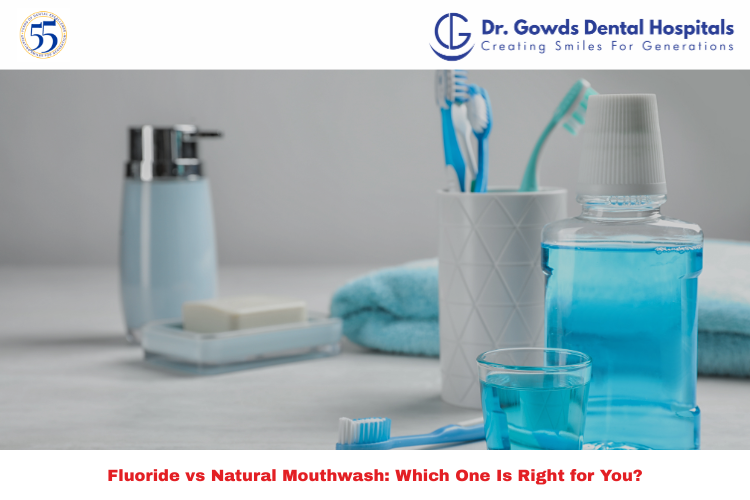Schedule Appointment



Oral care has come a long way, but one debate remains as lively as ever: Which mouthwash is better — fluoride or natural formulas? If you want to make the best choice for your smile this year, understanding the pros and cons of each option is essential. This comprehensive guide breaks down everything you need to know about fluoride and natural mouthwashes, empowering you to keep your teeth healthier than ever.
Many people overlook the true role of mouthwash in daily oral hygiene. While fresh breath is a welcome side effect, mouthwash’s real value lies in its ability to target bacteria in hard-to-reach places, strengthen enamel, and reduce the risk of gum disease. Choosing the right mouthwash formula can amplify the effectiveness of your brushing and flossing routine, leading to long-lasting dental health benefits.
Fluoride has been a staple in oral health for decades. Here’s why:
Fluoride works by remineralizing tooth enamel — repairing damage caused by acids from plaque bacteria and sugary foods. This makes your teeth more resistant to decay and cavities. It also helps reverse early decay before it becomes a problem.
Though fluoride is highly effective, it’s important to use it as directed. Children under six should avoid swallowing fluoride mouthwash to prevent dental fluorosis. Overuse in adults may cause mild mouth irritation, so consulting your dentist is always wise.
The rising demand for natural, chemical-free products has pushed natural mouthwashes into the spotlight.
Natural mouthwashes usually avoid synthetic ingredients, opting instead for plant-based antimicrobials and soothing agents like:
Natural mouthwashes may lack fluoride’s cavity-fighting power. They are excellent for daily maintenance but may not be enough for individuals prone to tooth decay.
| Feature | Fluoride Mouthwash | Natural Mouthwash |
| Primary Function | Strengthens enamel, prevents cavities | Soothes gums, reduces bacteria naturally |
| Main Ingredients | Fluoride, sometimes alcohol | Herbal extracts, essential oils |
| Best For | High cavity risk, orthodontic appliances | Sensitive mouths, preference for natural |
| Side Effects | Risk of fluorosis in kids, irritation possible | Allergies to herbs, less cavity protection |
| Taste & Sensation | Minty, sometimes strong or medicinal | Herbal, mild, and refreshing |
| Usage Recommendation | Typically once daily, as advised by dentist | Daily, gentle enough for frequent use |
Do you frequently get cavities or have braces? Fluoride mouthwash might be your best friend. If you have sensitive gums or prefer chemical-free products, natural mouthwash could be a better fit.
Professional guidance is invaluable. At Dr. Gowds Dental, specialists assess your dental history and customize oral care recommendations, including mouthwash choice, at their convenient Gachibowli Branch, Madhapur Branch, Koti Branch, or Puppalaguda Branch locations.
Try the recommended mouthwash consistently for a few weeks. Notice improvements or any irritation. Oral care is personal — what works perfectly for one might not suit another.
Choosing mouthwash is just one part of a bigger picture: advanced dental care that’s customized to your unique needs. At Dr. Gowds Dental, their team combines the latest dental technologies with personalized advice to help you maintain optimal oral health.
Whether you visit their Gachibowli, Madhapur, Koti, or Puppalaguda branch, expect expert care and customized oral hygiene plans. Mouthwash recommendations are integrated into a holistic dental care approach — from preventive cleanings to advanced treatments.
The ideal mouthwash choice depends on your lifestyle, oral health status, and personal preferences. Some people even alternate between the two — using fluoride mouthwash a few times a week for cavity prevention and natural mouthwash daily for gentle care and fresh breath.
No matter what you choose, the foundation is consistent brushing, flossing, and regular dental checkups. Mouthwash enhances this routine but cannot replace it.
1. Can I use both fluoride and natural mouthwash?
Yes, alternating can combine benefits, but check with your dentist first.
2. Are fluoride mouthwashes safe for kids?
Only if recommended by a dentist and used under supervision to avoid swallowing.
3. Can natural mouthwash replace brushing?
No, natural mouthwash complements brushing but does not replace it.
4. Does mouthwash whiten teeth?
Some mouthwashes have whitening agents, but most focus on health, not cosmetic whitening.
5. How often should I use mouthwash?
Typically once or twice daily as per your dental professional’s advice.